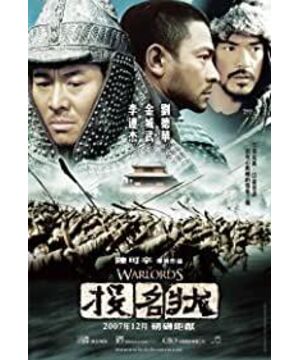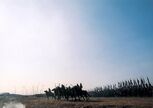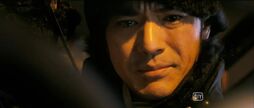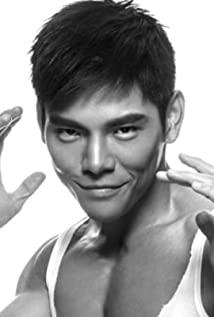The story is told successfully, but not complicated. In small terms, you can see brotherhood, in large terms, you can see political fables. Each way of interpretation is straightforward, and there is no need to "solve mysteries". If I can see anything new in it, it would be Mr. Wu Si's book: The Law of Blood Rewards.
Blood reward is the reward for bloodshed. Pang Qingyun, Zhao Erhu, Jiang Wuyang, the three brothers lived in an ecological environment that looked like a sea of red. In such a blood-rewarding world, how can you exchange your own blood for more rewards? If you use other people's blood for yourself in exchange for a reward? How to finally get rid of the blood reward world with a massive hemorrhage? ...Faced with this series of questions, the three brothers each gave different answers, but they were all marked with bloody red crosses in the end; their blood eventually became the capital and bargaining chip for others to exchange for rewards.
How to exchange their blood for more rewards
until the attack on Shucheng, the three brothers all face this problem together. They gave the same answer to this question, so in this part of the film, the three brothers can live and die the most, and show each other's heart.
Do bandits? Soldier? The deduction of the three brothers on this issue almost perfectly reproduces the first chapter of "The Law of Blood Reward": "Bandit Change". The current situation is turbulent, the people are extremely poor, and the only capital is their own blood. How to maximize the benefits under different conditions, you can get a glimpse of it by looking at several subtitles in the chapter of "
Bandit Change": Phenomenon 1: Bandit Farming
Phenomenon 2: Bandits Protecting the People
...
First Inference: Bandits The
second assumption of changing officials : the
third assumption: the bandits becoming the people The
fourth assumption: the people becoming bandits
...
Since the "Law of Blood Reward" is used to interpret the "Law of Blood Reward", rather than the "Law of Blood Reward", the theory in "The Law of Blood Reward" will not be repeated here. All in all, the results of the powerful analysis are clear: if Zhao Erhu and his like couldn't survive, they could only change from the people to bandits; now they can't survive as bandits, they can only change from bandits to soldiers.
——I didn’t expect that I would write such cold words. In the face of such a flesh-and-blood film, in the face of the vigorous sworn sworn of the three brothers after they accepted their names, and in the face of Shucheng's desperate fight in the bloody battle... I wanted to write more emotionally and emotionally. But perhaps the truth is so cold, when the blood of life and death and the sincerity of the heart cools down, the rest is nothing but a naked interest relationship.
Therefore, the film uses Jiang Wuyang's mouth to describe Pang Qingyun's thoughts: "He said he didn't believe in the vote, but he believed in me and my second brother." What about Pang Qingyun's other two brothers? Believe in their character? competence? loyalty? Loyalty? Maybe both, but not at all. ——The most fundamental thing is: Pang Qingyun is very clear that Zhao Erhu and Jiang Wuyang are completely consistent with their own interests at this moment. If they want to survive, they will use their only blood to exchange their own lives. , they are grasshoppers on a rope so there is absolutely no possibility of betrayal. What Pang Qingyun believed most was this.
Not only the three brothers, but also the group of bandits they brought out. This is why the two hundred people rushing in the front are like crazy demons willing to serve as meat shields; why a small bandit will use his body to block the cannon that hit Pang Qingyun. Another general who fought Shucheng together was dumbfounded: "Mad!" - If he could understand the living conditions of the Pang Qingyuns, he would know that the Pang Qingyuns were not crazy at all. In order to survive, these outlaws made the most shrewd choice.
To put it into a more detailed account: when Zhao Erhu was a bandit, the occasional distribution of rice would make the villagers happy, and it is hard to say that he was killed by officers and soldiers. Once you become a soldier, you only need to win a battle once, and the villagers can share their money with confidence and boldness. The relatives of the deceased took over the silver ingots of Bai Huahua with tears, - it is not difficult for anyone with a little knowledge of history to see that those silver ingots are enough for a few old people to live in comfort in their old age. If you continue to be a bandit but not a soldier, if you become a soldier and don't fight your life to win a battle, where will the money come from? The bandit who used his body to block the gun, he didn't want to save Pang Qingyun, he just wanted to save his whole family. The ultimate blood reward is life reward, and he has already accurately calculated the price of his life. (When summoning 200 meat shields, Zhao Erhu said, "There is a settlement fee!", and the responders gathered immediately. Everyone was willing to sell a small life at this price) - and the "life price" is "The Law of Blood Reward" The theme of the second chapter: "A Brief Study of the Price of Life". The first disagreement between the three brothers on
how to exchange the blood of others for themselves
was not long after the capture of Shucheng.
"Grab the money! Grab the grain! Grab the site!" - It is said that this line was originally "Grab the money! Grab the grain! Grab the woman!" It was changed to the current version when it was released in the mainland. Numerous historical facts have proved that the promise of wanton looting after the city is broken is the most effective incentive to lead troops to attack the city. Wanton looting means that there is no upper limit on the price of life; the price of life without an upper limit is the most worthwhile for people to sacrifice their lives for.
However, two soldiers routinely raped women after the city was broken, but they were pulled out by Pang Qingyun and beheaded. Not only did the two soldiers cry bitterly, but Zhao Erhu and Jiang Wuyang were also at a loss: "Why?" How could
Zhao Erhu and Jiang Wuyang know that the stage of exchanging their own blood for rewards has passed. What Pang Qingyun has to do now is to exchange the blood of others for his reward. You can grab money and food, but not women, which means that there are restrictions on the price of life. From no cap to limited, where does the difference go? it goes without saying. ——As for the killing of the surrendered army in Suzhou, it is more naked blood of the surrendered army in exchange for the reward of capturing Nanjing.
Unfortunately, this is only Pang Qingyun's choice, not Zhao Erhu and Jiang Wuyang's choice. The three brothers stood together because they had no choice. Once time has passed and there is room for choice, the differences between the three people will emerge, and the community of interests represented by the vote will not be so indestructible.
In fact, Pang Qingyun's judgment is the most rational. Zhao Erhu thinks that he has a choice, but it is not necessarily true: Can you really "go home and live a good life" without having to exchange other people's blood for rewards? After killing Suzhou and surrendering to the army, Zhao Erhu insisted on bringing the soldiers home, which was a big outbreak of contradictions at this stage. On the surface, his final change of heart was because of Pang Qingyun's vow and his last kneeling. But all this is not more powerful than a sentence: if you leave now, you will lead the crowd to rebel, and I will kill you.
Does Zhao Erhu have a choice?
He can only continue to move forward, otherwise everything will go backwards to the situation of selling blood for life, or even selling blood for life.
Just as Pang Qingyun said: "My life is like walking on thin ice. Do you think I can go to the other side?" - Of course Pang Qingyun has ambitions, but he can't help himself. Since there is no way out, don't look forward to the future, let's go all the way to the end!
Killing and surrendering the army is a manifestation of this determination. Being able to bend and stretch, taking the initiative to make deals with Kuiziying is another manifestation of this kind of determination. After completing the transaction, they attacked Nanjing and kicked the Kuizi camp away. Pang Qingyun was decisive enough.
How to use a massive hemorrhage to finally get rid of the blood reward world
is still the same sentence: "My life is like walking on thin ice. Do you think I can go to the other side?" The
blood reward world is extremely dangerous. In a red sea, Pang Qingyun seems to be like a duck , in fact, walking on thin ice. He was so eager to go ashore.
Now, the "other side" in Pang Qingyun's mind is looming: to be the governor of Jiangsu! The three-year tax exemption proposal to the Queen Mother is his longing for life after "going ashore". Unhesitatingly promising to "Shanzi Battalion take the lead in disarmament", it also means the determination to completely break with the world of blood reward: the army is the capital of blood reward, I, Pang Qingyun, don't even want the book now, I'm really not in this situation play!
And Zhao Erhu's judgment of the situation is always wrong: when he could not turn back, he wanted to turn back; now that he can go ashore, he is unwilling to go ashore. The communist ideal of emancipating all mankind is certainly good, just decades earlier. ——At this moment, the community of interests represented by the nomination certificate completely disintegrated.
At the end of the film, Pang Qingyun and Jiang Wuyang fought in the muddy water. Pang Qingyun, who could not bear to attack for a time, glanced at the throne of the governor, and immediately ruthlessly attacked. What does the governor's throne mean? Fame and fortune? Ambition? No, that was the other side that Pang Qingyun was seeking. ——I want to go ashore, but you are holding me back, what the hell are you a brother!
Is it wrong for Pang Qingyun to kill Zhao Erhu? But is it right that Zhao Erhu dragged Pang Qingyun and prevented him from going ashore? What is the difference between not letting Pang Qingyun go ashore and killing him? If he could go ashore with his brother, why would Pang Qingyun not do it? Even if my brother doesn't want to go ashore, can I go ashore by myself?
no! We have accepted the application form, not asking for the same life, but for the same death!
That would ruin the nomination. For a common goal, we can "but die together". Now the goals are completely different, but seeking the same death is a life-and-death situation. In order to finally get rid of the world of blood reward, Pang Qingyun needs a large-scale hemorrhage, including disarmament (the blood did not flow out, but it no longer belongs to him), including killing Zhao Erhu. The governor of Jiangsu was Pang Qingyun's last blood reward.
The second sister-in-law is the vote for the name, and the vote for the name is the second sister-in-law.
Many people think that the clue of the second sister-in-law (Xu Jinglei) is too pale and powerless in the "Vote for the Name", but I think this part of the plot is set just right.
Start elsewhere.
From the point of view of blood remuneration, or in other words, from the point of view of economics, every choice made by Pang Qingyun is correct. If Pang Qingyun can explain the strong relationship between Zhao Erhu and Jiang Wuyang, then even if these two brothers are a little slow, it will not be incomprehensible.
The problem is that Pang Qingyun can't bare the truth.
The gentleman is compared to righteousness, and the villain is compared to profit. In order to achieve the ultimate goal of interests, we need too much moral veneer. And different moral coats, which are painstakingly created for different interests and goals, are often self-contradictory. Interests are constantly evolving, and ethics must be consistent, right? As a result, morality has become a double-edged sword to a certain extent: when it is consistent with immediate interests, it can become a gorgeous coat for profit-seeking behavior, providing internal motivation for profit-seeking behavior; and when it runs counter to immediate interests At times, it often becomes the fetters of the heart.
This is how Zhao Erhu and Jiang Wuyang were bound by morality and could not escape.
Pang Qingyun didn't want to untie them. At this point, Jiang Wuyang seemed to be "opened up". Some people think that Jiang Wuyang is "slicker" than Zhao Erhu, but I don't think so. If you want to say "smooth", it means to a certain extent "put morality on both sides, and put the word in the middle", and Jiang Wuyang is not such a person. Although he has also bowed his head in front of reality, such as going with Pang Qingyun to make a deal with Kuiziying, for example, after listening to Pang Qingyun's powerful analysis, he reluctantly killed and surrendered, but not only did he not give up morality, but he always needed to There is a "reasonable explanation" in morality: why the previous set of moral principles does not apply, why new moral principles are needed in new situations, and why the two moral principles can coexist without contradiction.
The earliest moral code of the three brothers is very simple, which is three words: vote for the name! This moral code made its first major revision when catching a soldier who raped a woman and beheading it: "We were bullied before, and now we cannot bully others." How high-sounding, how righteous, and in no way contrary to the moral standards represented by the vote. Jiang Wuyang accepted this explanation at the earliest and took the initiative to act as the executioner:
"Whose life is yours?"
"Big brother's..."
No matter how far-fetched this explanation is in fact, it is reasonable for Jiang Wuyang. This major revision successfully provided a theoretical basis for "exchanging the blood of others for one's own reward".
Even in the subsequent killing and surrender of Suzhou, Jiang Wuyang, on the one hand, was forced by the current situation, on the other hand, he also accepted Pang Qingyun's moral rhetoric: "They are soldiers, and if they are soldiers, they will die." - Jiang Wuyang felt that this set of rhetoric was smooth. Reasonable, and then you can convince yourself to let go of the arrow.
Pang Qingyun explained it very hard. In the face of two brothers who are "similar to righteousness", he can hardly "speak for profit". He can only constantly provide annotations from a moral point of view, and he has to justify himself, and cannot contradict himself with the moral core of "name submission". He struggled for a long time, and eventually went bankrupt. ——On the matter of going ashore, he was at a loss for words; his adultery was exposed, which made him unable to explain.
Pang Qingyun's moral bankruptcy made Jiang Wuyang's trust in him vanish. The most fundamental difference between them is: for Jiang Wuyang, morality is the goal; for Pang Qingyun, morality is just a tool. Jiang Wuyang always thought that Pang Qingyun was playing a game of morality with them, but in fact he didn't even know what Pang Qingyun was playing. ——This kind of ignorance is most vividly shown in the killing of the second sister-in-law: "The sister-in-law is dead! You have no reason to kill the second brother!"
How sad and how ridiculous. At this juncture, Jiang Wuyang didn't even know what the core of the conflict was, and thought it was for women.
To a certain extent, the second sister-in-law is the name, and the second sister-in-law is a symbol of morality: in Jiang Wuyang's eyes, it (she) is very important, very crucial, and is the core of all contradictions. But in Pang Qingyun's eyes, although it (she) has some weight, it doesn't matter after all, and it has been fucked many times.
If you are Pang Qingyun, when you are sitting in the room and hear Jiang Wuyang shouting from the door, "sister-in-law is dead, you have no reason to kill the second brother", - should you laugh or cry?
The second sister-in-law, who was originally insignificant, was placed in such an understated position in the film, why is it unreasonable.
Who can play, who can play best
As mentioned above: Jiang Wuyang is very sad, he doesn't even know what Pang Qingyun is playing. Zhao Erhu is also the same as Jiang Wuyang.
So is Pang Qingyun very good at playing? Does he know what "Chen Gong" are playing?
In the world of blood reward, even though Pang Qingyun was walking on thin ice, he was still able to handle it with ease. But the white stripes in the waves landed on the shore, just like Li Kui went into the water. When he loudly asked for the tax exemption for three years at the court, I wondered how the princes of Gong and Gong were in the mood—would it be the same as when Pang Qingyun heard the sentence "You have no reason to kill the second brother"?
The governor's throne, Pang Qingyun thought it was the other side of his dreams, but he didn't know it was just a mirage. He only saw the knife of his brother in front of him, but he did not see the gun of the imperial court behind him. He only knew that killing would bleed, but he didn't know what was killing without blood.
who will play? Who can play the most?
In fact, the three brothers have the ultimate goal of "going ashore", but in order to achieve this goal, they made different judgments and different choices. They need to use their own practice to prove who is right and who is wrong, and the life and death among them is not a betrayal. It is a pity that the sea of suffering is boundless, and no one can cross it. "Voice of the Name" actually has the meaning of "Infernal Affairs" faintly.
View more about The Warlords reviews











